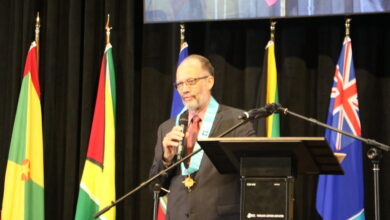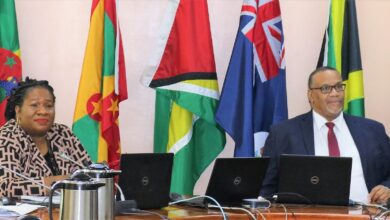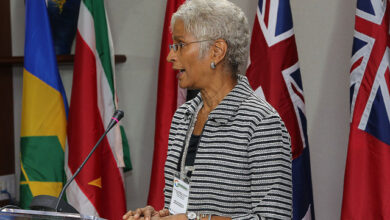(CARICOM Secretariat, Turkeyen, Greater Georgetown, Guyana) Permit me first to recognize the presence of the Hon. Joseph Gilbert, Minister of the Environment, Foreign Trade and Export Development of Grenada at his first meeting of the COTED. I also wish to recognize the presence of Sir Edwin Carrington, Ambassador of Trinidad and Tobago to CARICOM and immediate past Secretary-General of CARICOM.
It is my pleasure to welcome you all to this Thirty-Third Meeting of the Council for Trade and Economic Development (COTED). As fate would have it, my first two Ministerial Meetings since assuming office as Secretary-General have been with this Council, the first being the Special Meeting of the COTED Agriculture in Dominica. This is as it should be, as it is in this Council that I began my involvement in regional matters. At that time, it was called the Common Market Council of Ministers. I can truly say that the groundings I received in this forum have helped to prepare me for the task ahead in my new role.
Since my assumption of office on August 15, I have had the opportunity to visit some Member States and meet with a wide-cross section of persons in Government, the private sector and the wider civil society. These visits, which will continue in the New Year, are affording me a very valuable opportunity to gauge expectations and experiences within our Community. I have also had the benefit of the views and positions of the Heads of government who have expressed their desire for the work that we do, to be seen to have an impact on the ground in the Member States. In other words, the citizens for whose benefit and in whose interest we are working must see and recognise the results of that work.
In these early days, I have been encouraged by the hope and support for the integration movement, even as there has been exasperation at, what some have seen as, the slow progress or even stagnation of the CARICOM Single Market and Economy. There is frustration at the perceived inconsistent application of, and in some cases, non-adherence to the decisions of the Organs of the Community. One constant concern, particularly to our youth, revolves around the procedure for issuance and recognition of skills certificates, which allows for free movement of skilled Community nationals. These procedures are not harmonised across all Member States.
There is also widespread unease over the length of time that some issues remain unresolved and are constantly on the agenda of our meetings. It has caused our stakeholders to call into question whether we are focussed enough or committed sufficiently to take the required actions. I am of the view, however, that there may be capacity constraints in our Member States as well as within the Secretariat which could preclude us from advancing as quickly as we would like. Perhaps the time has come for us to prioritise our agenda in a strategic manner. Perhaps the time has come for the Ministerial sessions of the COTED to be more strategic in its outlook. The time consumed in rehashing the issues without resolution, has an economic cost and it fuels frustration among us all.
Madame Chair, at their Special Retreat here in Guyana last May, our leaders outlined the priorities and the vision they had for the Community. It falls to the COTED, to follow through on a key mandate coming out of that Retreat, which is the consolidation of the gains of the CARICOM Single Market and Economy. It is a challenge that must be addressed urgently, given the expressed wishes of our Heads of Government.
This effort must be linked to the imperative of expanding production and enhancing the competitiveness of our producers. Perhaps, therefore, the agendas of this Council should place greater focus on the productive sector and its competitiveness.
The latter imperative will also have an effect on another priority of our Heads of Government – job creation. Further such expansion of production and increase in competitiveness would allow us to maximise the opportunities within the CSME as well as exploit those provided by the trade agreements the Region has concluded.
To meet these challenges will no doubt require collaboration, not only in the public sector but more critically, with the private sector. From what I have been told by the private sector in my interactions, there is a pressing need for us to review the governmental processes for the conduct of business which has a bearing on the cost of doing business in our Community. They are of the view that should this be addressed, as well as the harmonisation of those procedures across the Community; it would result in more active cross-border trading and investment and increase our overall competitiveness. The item on the agenda dealing with harmonisation of the legislation relating to the Rights of Establishment begins to address such concerns.
We should take note that the World Bank’s Ease of Doing Business Index ranks CARICOM countries at varying levels ranging from 52 to 174. This suggests that we still have a long way to go in terms of improving and harmonising our policies and procedures.
And we have to move quickly to remedy this situation as there is interest in foreign investment in our Region, not only from our traditional partners but also from major emerging nations. Recently an economic and trade mission from China visited the Region scouting for prospects and also signed significant agreements for major projects in some of our Member Sates. Next week, a high level private sector team from Japan will be on a similar mission when Trinidad and Tobago hosts the CARICOM-Japan Business Seminar on behalf of the Region. Indications are that several very high-ranking business officials from top Japanese companies will be present.
The onus is therefore on the Community and its Member States to do what is necessary to capitalise on the opportunities which these missions may bring. This task involves the strengthening of relations with the private sector, who are the ones who actually trade and create jobs. Perhaps, the time is now for a more structured interface between this Council and the regional private sector and in doing so, include other stakeholders such as labour.
Madame Chair, the agenda before us is long; there is much work ahead; we need to advance the integration of our Community. This Council, charged with the responsibility to promote trade and economic development of the Community, has a major role to play in that regard.
While our capacity may be constrained, the global environment is not waiting on us. The on-going global economic and financial crises demand that we face such challenges collectively rather than separately. The imperative for integration is as relevant now as when the Treaty of Chaguaramas was signed.






